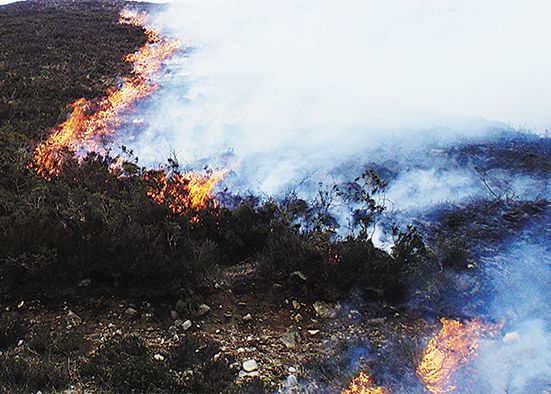Dry period prompts appeal over Mournes
Dry period prompts appeal over Mournes
17 August 2022

AN appeal has been issued to visitors to the Mournes to be careful to ensure they are not responsible for starting fires which would spread rapidly in tinder dry conditions.
Northern Ireland Water said people must be conscious that there is a real risk of wildfires similar to those which destroyed over 900 acres of precious habitat in the Mournes last year.
The devastating blaze had a lasting impact on the environment, which is a precious and scientifically important area that is home to a rich variety of wildlife and habitats.
Since the blaze, the land has been slowly recovering, but in some areas instead of heather, purple moor grass has become dominant in the areas around Thomas Mountain.
And while the land devastated by last year’s blaze is recovering slowly, mountain rangers have suggested that it could take up to 30 years to restore it to what it was before.
Appealing for the public to exercise caution while in the high Mournes and other countryside areas, NI Water said the recent spell of dry weather has increased hazard warnings for wildfires.
Officials say that coupled with this, the fire risk has risen due to an increase in activities such as littering, use of disposable barbecues and burning waste.
“Wildfires not only pose a risk to human life, wildlife, property and the environment, but also to our drinking water catchment areas,” said NI Water’s catchment liaison officer Rebecca Allen.
“Many areas which might be prone to wildfires like the Mourne Mountains are also areas which provide our drinking water. While these places are great to visit and very picturesque, it’s important for visitors to remember that these areas provide drinking water and so special care must be taken of them.”
Ms Allen explained that a water catchment is where water is collected by the natural landscape into rivers, lakes and streams.
And she revealed that NI Water controls 24 drinking water catchments supplying water to all of Northern Ireland.
“NI Water always work hard to deal with the problem of wildfires and we can assure customers that tap water quality is unaffected and is of a very high quality,” she continued.
“However, wildfires within these areas not only pose a terrible risk to all life but removes the primary layer of vegetation, leaving the burned bare soil exposed to erosion, which then makes its way into the reservoirs, which is treated to become our drinking water.”
Ms Allen said these fires can also have a devastating impact on habitats and wildlife, reminding the public that deliberately setting wildfires is a criminal offence, urging anyone who witnesses such behaviour to contact police immediately.
Helpful dos and don’ts in hot weather include not lighting fires in and around forests or open land, not attempting to intervene or fight fires under any circumstances.
Anyone who sees a fire is asked to round up their family or friends and move to a safe location or upwind of the fire and dial 999 to report the fire and its location. The public is also asked to evacuate if instructed to do so and co-operate with emergency service instructions.
Visitors to the countryside are asked to leave no trace, take their rubbish home with them, never fly-tip waste material, extinguish cigarettes and other flammable materials properly, never throw cigarette ends out of car windows and avoid using open fires.
NI Water’s appeal came just days before National Trust rangers tackled a 15 metre stretch of gorse fire along the edge of the Dundrum Coastal Path.
The rangers used 400 litres of water and with help from the newly acquired Argocat and fire suppression unit from the Mourne Wildfire Recovery Project, they were able to extinguish the fire.
The rangers are grateful to Rooney’s Garage in Dundrum for allowing them to refill their water tank and with the hot weather set to continue, the National Trust says the land around Murlough and the Mournes has become extremely dry, enabling even the smallest ember to cause costly damage to the landscape.

